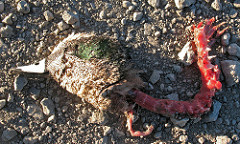Gastroesophageal reflux disease (GERD) is a condition in which the esophagus becomes irritated or inflamed due to reverse flow of acid from the stomach. The esophagus is the tube starting from throat and extending up to the stomach. The food carried through esophagus to the stomach. The stomach secretes hydrochloric acid after a meal to help in the digestion of food. The inner lining of the stomach protects corrosion by this acid with the help of protective mucus secretion. This protective function is absent in esophagus. As a result acid coming in to contact with esophagus can damage it. As the esophagus lies just behind the heart, sometimes the sensation of acid burning in the esophagus is also know as heartburn. Normally, the reflux or reverse flow of acid to esophagus is prevented by a ring of muscle at the bottom of the esophagus, called the lower esophageal sphincter. This sphincter relaxes during swallowing to allow food to pass. It then closes or contracts to prevent flow in the opposite direction. In case of GERD, this sphincter relaxes while the food is being swallowed, which allows stomach contents and corrosive acid to revert back to esophagus and cause damage to the lining of the esophagus. GERD can affect any age group from infants and children to adults. No one knows the exact cause of gastroesophageal reflux. The following are several contributing factors that weaken or relax the lower esophageal sphincter, making reflux worse:
Lifestyle: alcohol, cigarettes, obesity, constant lying posture
Medications – Calcium channel blockers, theophylline, nitrates, antihistamines
Diet – Fatty and fried foods, chocolate, garlic and onions, drinks with caffeine, acid foods such as citrus fruits and tomatoes, spicy foods, mint flavorings
Eating habits – Eating large meals, eating soon before bedtime
Other medical conditions – Hiatal hernia, pregnancy, diabetes, rapid weight gain
GERD – gastroesophageal reflux disease – is more than just chronic heartburn. The irritation of esophagus caused by stomach acid can lead to complications such as narrowing of the esophagus, ulcers and even a slightly increased risk of esophageal cancer. Most people can manage the discomfort of heartburn with lifestyle modifications and over-the-counter medications.
Common signs and symptoms of GERD include:
Heartburn
Chest pain, especially at night while lying down
Difficulty swallowing
Coughing, wheezing, asthma, hoarseness or sore throat
Regurgitation of food or sour liquid
When you swallow, the lower esophageal sphincter – a circular band of muscle around the bottom part of your esophagus – relaxes to allow food and liquid to flow down into your stomach. Then it closes again. However, if this valve relaxes abnormally or weakens, stomach acid can flow back up into your esophagus, causing frequent heartburn and disrupting your daily life. The acid backup is worse when you bend over or lie down. This constant backwash of acid can irritate the lining of your esophagus, causing it to become inflamed. Over time, the inflammation can erode the esophagus, producing bleeding, or narrow the esophagus, causing difficulty swallowing or even breathing problems. When there’s evidence of esophageal irritation or inflammation, you have GERD. However, many people with GERD will have a normal-appearing esophagus despite symptoms. GERD may be related to other conditions such as hiatal hernia. In this condition, also called diaphragmatic hernia, part of your stomach protrudes into your lower chest. If the protrusion is large, a hiatal hernia can worsen heartburn by further weakening the lower esophageal sphincter muscle.
Some factors that can make GERD worse include:
Certain foods, such as fatty foods, spicy foods, chocolate, caffeine, onions, tomato sauce, carbonated beverages and mint
Alcohol
Large meals
Lying down soon after eating
Certain medications, including sedatives, tranquilizers and calcium channel blockers for high blood pressure
Cigarette smoking
Conditions that cause difficulty with digestion can increase the risk of GERD. These include:
Obesity
Hiatal hernia
Pregnancy
Asthma
Diabetes
Peptic ulcer
Delayed stomach emptying
Zollinger-Ellison syndrome
In addition to irritation and inflammation of the esophagus, chronic reflux of stomach acid into the esophagus can lead to one or more of the following conditions if left untreated:
Esophageal narrowing (stricture)
Esophageal ulcer
Barrett’s esophagus
You may eliminate or reduce the frequency of heartburn by making the following lifestyle changes:
Control your weight
Eat smaller meals
Loosen your belt
Eliminate heartburn triggers
Avoid stooping or bending
Don’t lie down after a meal
Raise the head of your bed
Don’t smoke
Homeopathy in GERD:
Homeopathy helps in reducing inflammation of esophagus caused by irritation by stomach acid. Patient there by gets relief in pain and other symptoms of GERD. The homeopathic medicines are fast acting and give prompt relief in recurrent episodes of heartburn. The steady control over GERD helps in preventing long term complications of GERD like ulcer, narrowing and strictures of esophagus. Homeopathic treatment and long term and permanent relief in recurrent complains of GERD changes quality of life to a great extent where the patients are freed from recurrent problems of digestions and they can enjoy their ebver4yday food without getting heartburn and nausea and vomiting.
www.homeopathyonline.in
Dr Harshad Raval MD[hom] Honorary consultant homeopathy physician to his Excellency governors of Gujarat India. Qualified MD consultant homeopath ,International Homeopathy adviser, books writer and columnist. Specialist in kidney, cancer, psoriasis, leucoderma and other chronic disease,. www.homeopathyonline.in email : info@homeopathyonline.in

